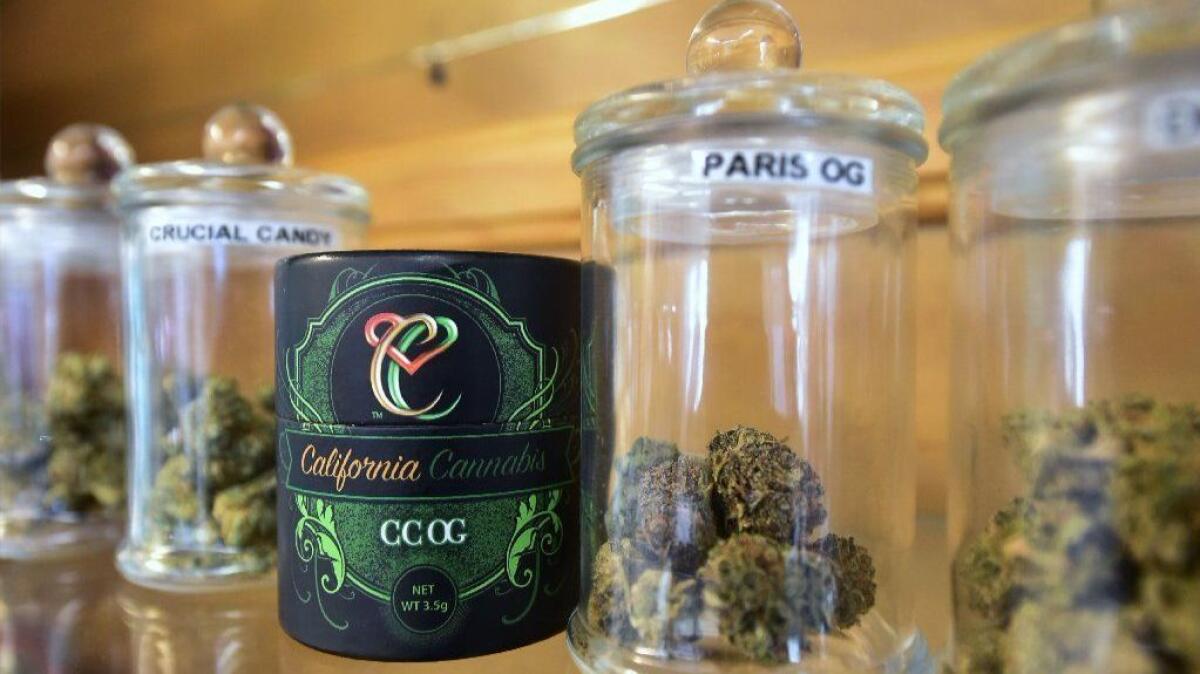Trump administration abandons crackdown on legal marijuana

Reporting from Washington — The Trump administration is abandoning a Justice Department threat to crack down on recreational marijuana in states where it is legal, a move that could enable cannabis businesses in California and other states that have legalized pot to operate without fear of federal raids and prosecution.
President Trump personally directed the abrupt retreat, which came at the behest of Republican Sen. Cory Gardner of Colorado. White House officials confirmed the policy shift Friday. Trump did not inform Atty. Gen. Jeff Sessions in advance of the change in policy, an almost unheard of undermining of a Cabinet official.
Gardner was incensed in January when the Justice Department announced that it was rescinding an Obama-era policy that directed federal prosecutors not to target marijuana businesses that operate legally under state law. The senator had blocked Justice Department nominees in retaliation.
In conversation with Trump this week, Gardner said he was assured that the federal government would not interfere with his state’s marijuana industry and that Trump would champion a new law that gives states the authority to set their own pot policies. In response, he lifted his remaining holds on nominees.
“Late Wednesday, I received a commitment from the president that the Department of Justice’s rescission of the Cole memo will not impact Colorado’s legal marijuana industry,” Gardner said, referring to the Obama-era policy, named after former Deputy Atty. Gen. James M. Cole, who issued it.
“Furthermore, President Trump has assured me that he will support a federalism-based legislative solution to fix this states’ rights issue once and for all.”
White House officials confirmed that Gardner’s comments accurately reflect the administration’s position.
“The president did speak with Sen. Gardner yesterday and again today,” White House Press Secretary Sarah Sanders told reporters Friday at the White House. She said “the president is a firm believer” in states’ rights and confirmed Gardner’s account of the assurances he received from the president was accurate.
A Justice Department official who requested anonymity to speak frankly about internal discussions confirmed that Trump did not consult Sessions before talking with Gardner. Sessions, a longtime anti-drug crusader, personally announced the administration’s pot crackdown policy in January.
The attorney general and Trump have had a frosty relationship for months, largely over Trump’s continued resentment that Sessions recused himself from any involvement into the federal investigation into Russian interference in the 2016 election.
Trump’s decision to undercut a major Sessions initiative without informing the attorney general in advance was a striking example of how low their relationship has sunk.
California is one of eight states in which recreational marijuana is legal. The administration’s announcement in January that it was allowing prosecutors to target businesses selling pot legally under state laws put a cloud of uncertainty over the rapidly growing cannabis industry.
The talk of a crackdown threatened to slow investment in marijuana companies, which risked shutdown and seizure of their products at the decision of a single U.S. attorney. Under federal law, marijuana remains categorized as among the most dangerous drugs available, and one that has no valid medical purpose.
Marijuana stocks, which started the day down, surged after word spread of the Trump administration’s new posture toward the industry.
The mixed signals coming out of the administration, however, left some marijuana advocates proceeding with caution.
Aaron Lachant, an attorney in Los Angeles who represents marijuana businesses, expressed concern that Gardner’s deal might apply only to Colorado.
“The agreement itself appears narrow and only applicable to that state,” he said. “Nevertheless, it is an encouraging sign when in the last year all the messages coming from Washington have been about enforcement. This suggests they are finally moving toward policy solutions.”
A leader of the Congressional Cannabis Caucus, Rep. Earl Blumenauer (D-Ore.), called the commitment Gardner secured from Trump “another head-spinning moment.”
“We should hope for the best, but not take anything for granted,” Blumenauer said. “Trump changes his mind constantly, and Republican leadership is still in our way.”
Blumenauer is championing a measure that would prohibit federal law enforcement from using any money to crack down on recreational marijuana businesses operating legally under state law. That would expand an existing law that prevents federal law enforcement agencies from using their funds to go after companies legally selling medical marijuana, which is permitted in 29 states. The ban is the result of a budget rider Congress approved in 2014, and has renewed multiple times since.
Persuading Congress to lift the prohibition on enforcement actions against recreational marijuana is proving more challenging. Lawmakers have been reluctant. They have even prohibited sales of recreational marijuana in Washington, D.C., where voters approved it.
Yet if Trump follows through on his commitment to Gardner, the political equation could change. Trump’s support for looser federal marijuana laws could draw other Republicans to join him. A Gallup poll in October found 67% of Americans support marijuana legalization. That support is bipartisan. For the first time, the poll found, most Republican voters favored legalization.
“It has been a long and difficult process, but we may now be seeing the light at the end of the tunnel,” said an email from Mason Tvert, who co-directed the campaign to legalize recreational marijuana in Colorado. “This is one more step toward ending the irrational policy of marijuana prohibition, not only in Colorado, but throughout the country.”
Times Staff Writer Joseph Tanfani contributed to this report.
More stories from Evan Halper »
Follow me: @evanhalper
UPDATES:
2:55 p.m.: This article was updated with additional detail and reaction.
The article was originally published at 12:55 p.m.
More to Read
Get the L.A. Times Politics newsletter
Deeply reported insights into legislation, politics and policy from Sacramento, Washington and beyond. In your inbox three times per week.
You may occasionally receive promotional content from the Los Angeles Times.











